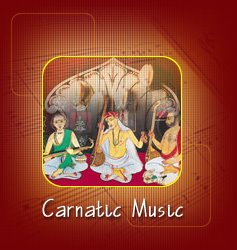 Biography
BiographyBhadrachala Ramadas - Popularly known as Bhakta Ramadas, he was born Gopanna to Linganna Mantri (a surname he kept as a result of one of his forebears being a minister at the court of a king) & Kadamba (sister of Madanna, a brahmin minister to TaniShah), in 1620 in Nelakondapalli, a small village in Khammam district, Andhra Pradesh. Since childhood, he imbibed his family's interest in spirituality and composed several keertanas on Raama. His devotion to Vaikunta Rama at the temple at Bhadrachalam, a small village in the middle of the jungle on the northern banks of the holy river Godhavary, earned him his name Bhadrachala Raamadaas. His guru was Raghunatha Bhattacharya.
During the reign of Abdul Hasan Tana Shah,(the nawab of the Qutub Shahi Dynasty at Golconda), Ramadas (Gopanna), thanks to his uncle Madanna, was appointed as a Tahsildar at Bhadrachalam, a pretty and picturesquely situated temple town on the Godavari river. Ramadas was always distracted and his intense love for Lord Rama compelled him to build a temple at Bhadrachalam. He collected money for the construction from the citizens, but didn't have enough. So he borrowed from the tax revenue of the nawab and gave his god a worthy abode, vowing to return the money. The nawab was furious and sentenced Ramadas to 12 years in prison. Raamadaas thus earned the name Bandekhana Raamadaas. Frustated at god's indifference to his pleadings, Ramadas composed some of the finest keertanas in his prison cell (reminding Raama of his services in Ishvaku Kula Tilaka).
It is said that Raama & Lakshmana in the guise of two youngsters paid up his dues and got his release papers. The golden coins paid by Raama are known as Ram Tanka coins .They can be seen even today. These coins have the Pattabhishekam scene on one side and the picture of another Rama Bhaktha, Hanuman, on the other side. The nawab was moved and recognized the greatness of Raamadaas and released him immediately and gave him land around Bhadraacalam to continue his dedicated service to Bhadrachala Raamamoorty. Raamadaas spent the rest of his life on these lands and composed further moving poems that were to inspire Tyagaraja: in ksheera saagara sayana in devagaandhaari, he says "Dhirudau Ramadasuni Bandhamu dirchinadi Vinnanura Rama?" (O Rama! I have heard how You obtained the release of the bold Ramadas from his prison life) ; in brindaavanalola in thodi, in kaligiyunde gada in keeravaani, in Emi dova balkuma in saaranga and in Prahlaada Bhakti Vijayam he says "kaliyugamuna vara bhadra calamuna nelakonna raamacandruni pada bhaktula kella varudanandagi velasina shree raamadaasu vinutintu madin" (I praise Sri Raamadaas, who shines in this world as the supreme devotee of Sri Raamacandra, who shines forth from his seat at Bhadraacalam in this kali Yuga).
Background: Named Gopanna by his parents Linganna and Kamalamba, he became known as Ramadas (Das meaning servant or slave), because of his deep devotion to Lord Rama.
Region: He belonged to Nalakondapalli, a small village Andhra Pradesh.
Mudra: Bhadraadivaasa, Ramadas
Contribution: He composed in the keertana form (the precursor to the Kriti form) and his songs contain multiple Charanams. Tyagaraja seems to have been a great admirer of Ramadasa’s devotion to Rama and praises him in a few of his compositions. His language is very simple and music very pleasing. His works include Manache Sloka, Dasabodha and Sundara Kandam of Ramayana.
Theme: The theme was predominantly devotion.
Languages used: Mostly Telugu and occasionally Sanskrit.
Signature: He used several mudras like Bhadrachala, Bhadradri or Bhadragiri.
Popular Compositions: Emayyarama (Kambhoji), Rama dayajudave (Dhanyasi), Paluke bangara mayena (Anandabhairavi), Nannubrovu (Kalyani) etc. Other compositions are positive invocations, favored by traveling minstrels, including the Tondaiman rulers of Pudukottai in Tamil Nadu, who popularized his songs. Among his other accomplishments is the creation of the whole Ramayana story in the form of a prose-poem, a Choornika. Ramadas described himself in this way in the last verse of his Dasarathi Satakam: "Allana Linga Mantri Suthudu(son), Atreya Gothrudu, Adi Sakha , Kancherla Kulothbhavudu, Gopakavindrudu." Bhadraacala Raamadaas lived for 68 years.
Compositions:
alola tulasi - shankaraabharanam
adugu daati - mohanam
amma nannubrovave - saveri
antaa raamamayam - aananda bhairavi, kaamavardhani
bhajare shreeraamam - kalyani
caranamule nammiti - kapi
dasharatha raama - shankaraabharanam, kaapi
dheena dayaalo - bhairavi, kaapi
diname sudinamu - kaapi
E teeruga - naadanaamakriyaa
edanunnaado - naata kurinji
ee vela nannu - kamas
emayya raama - kaambhoji
ennagaanu raama bhajana - kamavardhani
ento mahaanubhaavudavu - shankaraabharanam
etiki dayaraaduraa - mukhaari
evaru dooshincinanemi - aananda bhairavi
garuDagamana raaraa - shurutti, kaamavardhani
hari hari raama raama - dhanyaasi
itaramu leruganayyaa - shankaraabharanam, naadanaamakriyaa
kaakutstha tilakudu - asaveri
kamalanayana vaasudeva - shenjurutti
mithilesha tanaya - kaambhoji
muchhataina naadavemiraa - huseni, naadanaamakriyaa
naa moraalakimpa - vasanta
narayana narayana - shankaraabharanam
nammina vaarini - dhanyaasi
nannu brovamani - kalyani
narahari deva - yaman kalyani
narulaara chedi - shankaraabharanam
O raama nee - yamunaa kalyani
O raghunandana - madyamavati
O raghuveera - kedara gowla
paahi maam raamaayante - yadukula kaambhoji
pahi raama prabho - madyamavati
paalayamaam shree - madyamaavati
paavana raama - dhanyaasi
paluke bangaara maayenaa - aananda bhairavi
raama daivashikhaamanee - thodi
raama raama bhadraacala - neelaambari, aahiri
raama raama raama - mukhaari
raama raama seetaaraama - aananda bhairavi
raama raama shreeraama - dhanyaasi
raama sudhaambudi - saveri, madyamavati
raamaa dayajoodave - dhanyaasi
raamaa naa manavi - aananda bhairavi, asaaveri
raamabhadra raaraa - shankaraabharanam
raamajogi mandu - vasanta, kamaas
raamakrsihna govinda - dhanyaasi
raaraa naavenna - kambhoji
rakshincamanu marokkeda - sahaanaa
seetaaraama seetaaraama - huseni
shree raama naamamu - naadanaamakriyaa
shree raamula - saveri
swaami nanu - shurutti
taraka mantramu - dhanyaasi
tagunayya dasharatha - shankaraabharanam



No comments:
Post a Comment